
Fighting Asian hornets in Eggerberg
Have you discovered an Asian hornet's nest? We'll be on site quickly! Call now - Daily Mon-Sun 07:00-21:30. Contact us now: 058 510 22 54
Having the Asian hornet's nest removed
Originating from South-East Asia, Vespa velutina, a hornet species, has aggressively spread to Switzerland and the entire subcontinent. Despite its non-hostile behavior towards humans, it has become known as a honey bee hunter, raising alarm among beekeepers. Only a few of these hornets are needed to launch an attack that wipes out a colony of bees in just a few hours. If you have discovered a hornet's nest on your house, patio, shed, or in your blind box, contact our experts for hornet nest removal in Eggerberg!
Use the uncomplicated telephone service of the Hornet experts in Eggerberg and simply inform us at 058 510 22 54, we will be on site quickly so that you and everyone in your area feel completely safe again.
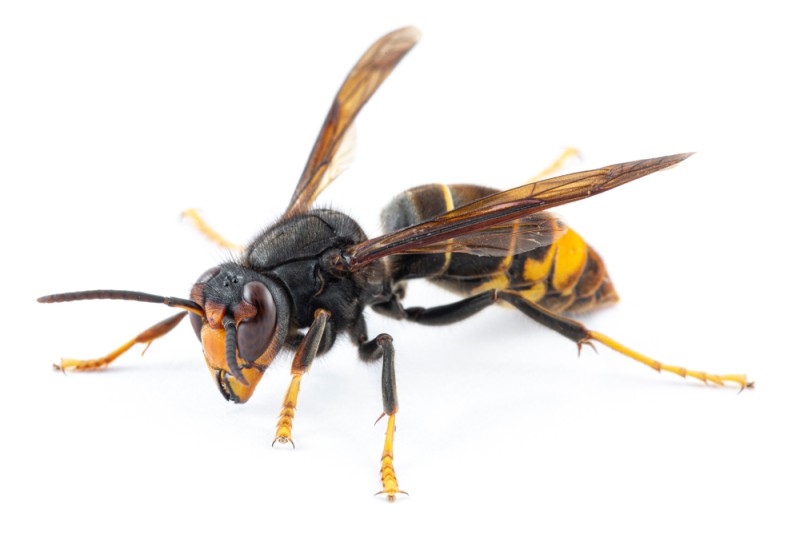

Appearance of the Asian hornet
Here are some characteristics that distinguish the Asian hornet:
1. Size: The queen can reach a length of about 3 cm, while the workers are slightly smaller and measure about 2.5 cm.
2. Color: The Asian hornet has a dark body that is almost black, with a yellow stripe at the back of the abdomen. Its face is orange-yellow.
3. Wings: The wings are dark and almost smoky gray.
4. Legs: The hornet has yellow tips on its legs, which is a striking distinguishing feature when it flies.
5. Nest: The Asian hornet's nest is often high in the trees, but it can also be found underground or in tall structures such as chimneys. It has an oval shape and is made of chewed wood, which gives the hornet a papery texture.
It is important to distinguish the Asian hornet from the European hornet (Vespa crabro), which is more harmless and a natural part of the European fauna. If you suspect you have found an Asian hornet nest near you in Eggerberg, you should report this to the local authorities, or using our reporting form, as they can spread quickly and be harmful to bees and other insects. To avoid being attacked by the flying inhabitants, you should hire a professional pest controller such as the Hornet Experts Eggerberg. We can identify the nest beyond doubt and take further steps to remove the Asian hornets professionally.
News about the Asian hornet in Eggerberg
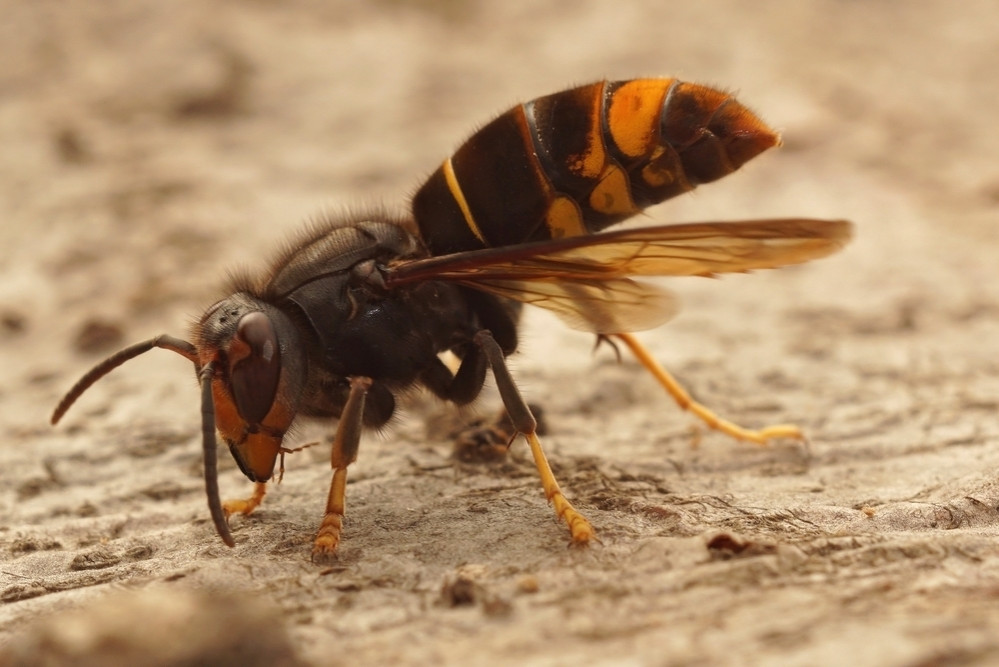
02.12.2025 Western Switzerland: Killer hornet eats bees
The territory of the Asian killer hornet has expanded considerably this year, with a notable increase reported in western Switzerland. This invasive species poses a significant threat to native bee populations, as bees make up the majority of its diet. The potential consequences are serious. Moreover, the hornet represents a danger to individuals with allergies to its venom.
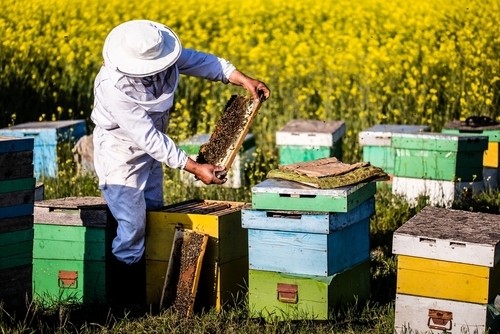
25.11.2025 Serious concerns about the bee population!
Asian hornets are inflicting significant harm on beehives across multiple parts of Europe, as reported by local beekeepers. Even a small number of hornets can destroy an entire bee colony within hours. This sharp decline in pollinators could have serious consequences for pollination, local ecosystems, and agricultural productivity.
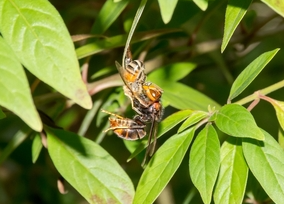
18.11.2025 Asian hornet doesn't just eat bees!
The danger it presents to insects is substantial!
The Asian hornet feeds largely on honeybees—up to 85 percent of its diet—alongside beetles and flies. This high level of predation not only poses difficulties for fruit growers but also further threatens already vulnerable bee populations.
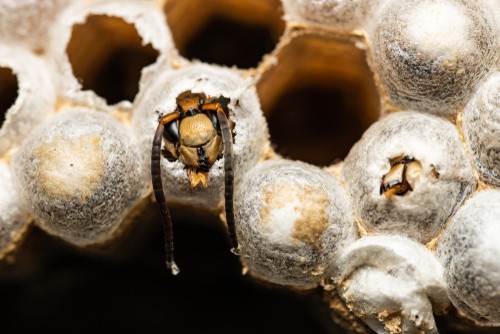
11.11.2025 How did the Asian hornet get to Europe?
The Asian hornet likely arrived in Europe unintentionally and has quickly expanded throughout France and nearby countries. Its adaptability to different environments and the absence of natural predators have contributed to its rapid spread. A single nest can generate several hundred new queens in one breeding season.
Asian Hornet Reporting Form
Please fill out all required fields and submit the form.
Help us!
If you discover an Asian hornet or a nest of this invasive species in Eggerberg, it is of the utmost importance that you report it immediately. The Asian hornet is not only dangerous to humans, but also poses a serious threat to native bee populations and the ecological balance in Switzerland.
Why is it important to report the find?
The establishment of the Asian hornet in certain regions has a profound effect on native insects, honey bees in particular. As this species preys on bees, it brings about a reduction in pollinator populations, ultimately affecting the local flora and agricultural output. By reporting sightings, experts can react quickly, remove the hornets or their nests and thus prevent the spread of this invasive species.
Notification form for sightings
Join our efforts to control the overpopulation of the Asian hornet in Switzerland and ensure the well-being of our native insect populations. Report any suspicions or sightings you may have through our special reporting form. With your help, we can take timely action and reduce the impact of this perilous species on our ecosystems.
Your contribution is crucial in the fight against the Asian hornet in Eggerberg. Together we can protect nature and maintain the balance of our ecosystems;
Thank you for your vigilant attention and your commitment to protecting our environment.
How dangerous is the Asian hornet?
The Asian hornet (Vespa velutina) is a predatory insect that originated in Asia and has spread in recent years to various parts of Europe, including France and now also Switzerland and in Eggerberg. Although it poses a threat to honey bees and native biodiversity, it is generally no more dangerous to humans than other wasp species. Nevertheless, there are some aspects to be aware of:
1. Threat to honey bees: The Asian hornet preys on honey bees, threatening native bee populations. A decline in bees can have a negative impact on pollination and thus on local flora and agricultural production.
2. Stings: As with other wasp and hornet species, the stings of the Asian hornet can also be painful. For most people, the stings are unpleasant but not dangerous. However, people who are allergic to wasp or hornet stings can suffer a severe allergic reaction, which in the worst case can lead to anaphylactic shock.
3. Aggressiveness: Although the Asian hornet is not necessarily more aggressive towards humans than other wasp species, it can become aggressive if it feels threatened, especially near its nest.
4. Ecological effects: Apart from the direct effects on honey bees, the spread of the Asian hornet can also disturb the ecological balance by affecting the populations of other insects.
It is important to understand that the Asian hornet is a separate species from the Asian giant hornet, also known as the "killer hornet" (*Vespa mandarinia*). The Asian giant hornet's significantly larger size, combined with its more potent venom and larger sting, can pose a higher level of danger to humans.
If you have discovered a nest, call us immediately: 058 510 22 54
Our hornet professionals in Eggerberg are certified by the VSS.
Frequently Asked Questions About Asian Hornets in Eggerberg
Possessing venomous stings known to cause severe or even fatal harm, the Asian hornet establishes itself as a highly dangerous insect, surpassing the level of risk commonly associated with other hornet species.
The Asian hornet, measuring up to 3 cm long, is a large stinging insect recognizable by its slender black body graced with a dense coat of stripes featuring vivid hues of orange, yellow, and black.
By nature, the Asian hornet appears shy and non-provocative. Nevertheless, it displays remarkable agility and aggressiveness when confronted or driven into a defensive position.
The Asian hornet's bites can have severe consequences for humans, as they are painful and have the potential to cause allergic reactions.
The Asian hornet is considered dangerous because of its poisonous sting, which is known to be more painful than the stings of other wasps and can result in allergic reactions.
To report an Asian hornet sighting, it is important to contact either a regional officer specializing in the conservation of wild bees or the responsible division within the Ministry of Agriculture.
Reporting sightings of Asian hornets is essential in order to prevent attacks and contain the reach of this highly territorial and aggressive species.
Professional hornet control is a must when addressing Asian hornets in Switzerland. Contacting a pest control service is strongly advised.
The Asian hornet does not enjoy legal protection; however, it is vital to strictly monitor their population to impede their spread.
While hibernating, Asian hornets may congregate as a collective or choose solitary dwellings within the corners of walls, structures, garden sheds, vacant houses, or natural tree hollows.
Would you like more information about Asian hornets? Then take a look at our FAQ's about Asian hornets.
Private inquiry form
For an uncomplicated request to remove an Asian hornet's nest, please use our contact form for private individuals.
Real estate inquiry form
Use our property management order form to request the removal of an Asian hornet's nest.




_12.jpeg)
_13.jpeg)
_12.jpeg)
_13.jpeg)